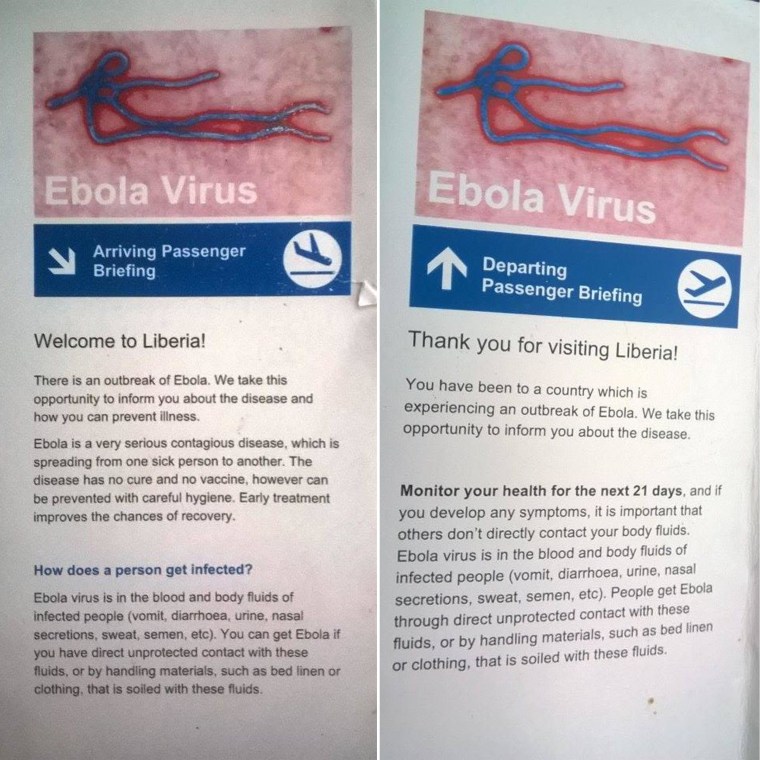BRUSSELS, Belgium — It’s the classic airport scene: a man hugs his wife and two daughters at arrivals. But in this case, the traveler had just stepped off a plane from the Ebola-stricken Liberian capital of Monrovia —meaning that some might shy away from such embraces. "I've been screened before getting on the plane," he pointed out before heading for the exit.
The twice-weekly flight from Monrovia to Brussels is now the only air link from the city to the European continent — and is the route most Americans would likely travel on their way home. Thomas Eric Duncan, who died in a Dallas hospital last week, traveled to the U.S. from Liberia via Brussels.
Only a handful of passengers from Brussels Airlines Flight SN1247 actually collected their luggage in the Belgian capital on Saturday morning. Those interviewed by NBC News said they were screened before boarding the flight, but not upon arrival in Brussels.
Dennis Orbus, a retired fire chief from Sacramento, California, who had helped with the Ebola response, said passengers had to fill out a thorough questionnaire and had their temperature checked twice in Monrovia — when entering the boarding area and then immediately before getting on the plane.
“It felt adequate to me, but I’m no professional,” he said. Other than the screening measures it seemed like a regular flight to Orbus. “It was normal, people were tired, sleeping, eating. Nothing unusual on the flight,” he said.
Nevertheless, Orbus said he was worried Ebola would eventually spread through global air travel. “It’s a big concern,” he said.
Another passenger, Bassirou Bashir Kante, a U.S. citizen born in Liberia who now lives in Maryland, shared such concerns. He said that he felt the screening process at Monrovia airport was not enough.
“I think we need a lot of medical professionals because anybody could be doing what they’re doing,” he said, adding that he felt screening in Sierra Leone, which he had visited two weeks earlier, seemed more thorough. After a flight to Switzerland for meetings, Kante said he was due to head to Washington, D.C., on Saturday night.
European airports have not begun screening arrivals from affected countries in West Africa, but the U.S. government said five airports will soon begin to do so. Airport officials in Brussels said that they have emergency measures ready to put in place if someone develops Ebola symptoms in flight or upon arrival, but added that that they have not yet needed them.
Authorities at Monrovia's Roberts International Airport stepped up screening procedures in August in response to the spread of the deadly Ebola virus — bringing in health workers to monitor passengers' temperatures and inquire about their contact with infected people.
On his recent trip out of Liberia to the United States, Benjamin Sanvee, 33, said his temperature was taken three times with a remote infrared thermometer — once at the entrance to the airport grounds, the second time before he checked in for his flight and the third time right before he boarded the plane. Sanvee said that each time, health workers wearing masks and gloves monitored the passengers for possible symptoms and wrote down their temperatures on pieces of paper, which the passengers have to carry over to the next checkpoint.

At the second checkpoint, passengers are also asked to answer a questionnaire comprised of several yes-or-no questions, Sanvee said, including a query about the last time the passenger had a fever.
Family members or friends accompanying the passenger have to say their goodbyes outside the fence surrounding the airport grounds, as only passengers and their drivers are allowed beyond the gate, he said.
“It was very stringent when I left," said Sanvee, a senate candidate in Liberia. Sanvee landed in the United States on Sept. 13 after switching to a connecting flight in Brussels, where he said he wasn't screened by health workers.
Several international carriers, including Delta, have suspended their flights into Monrovia following the outbreak, which the World Health Organization said has killed more than 4,000 people.
But Liberian officials caution that travel restrictions won't contain what has become a "global public health crisis."
"This measure will not stop the disease, it will stop and punish people already affected by the disease," said Tolbert Nyenswah, assistant health minister for Preventive Services and head of the Ebola Incident Management System. "The countries affected need all the international support to stop Ebola — not further isolation."